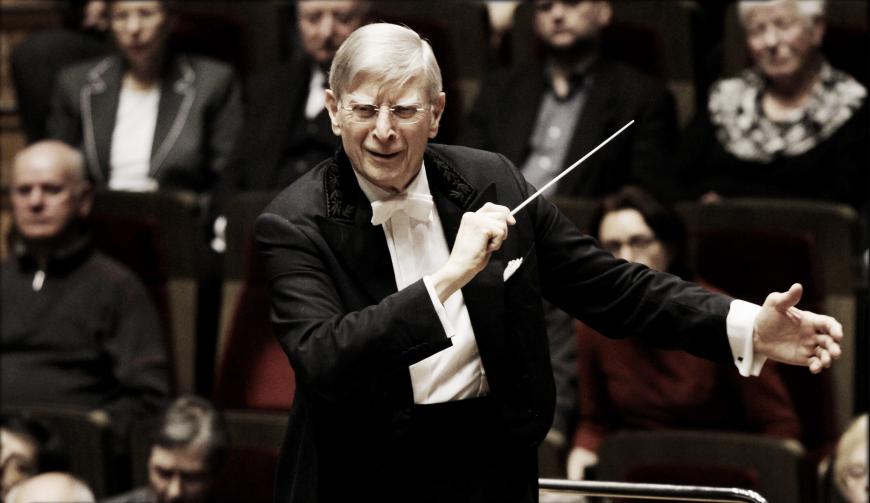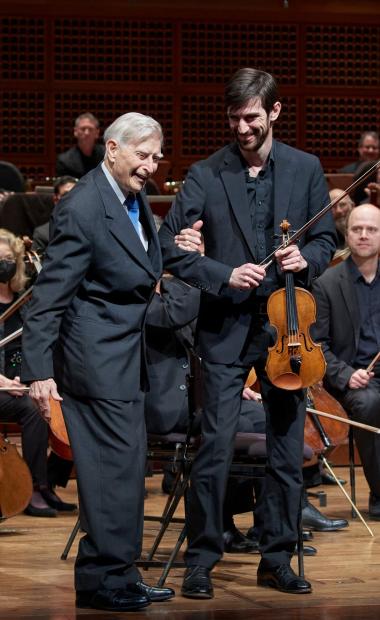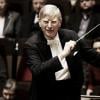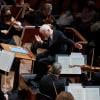
The less that is known about his recent fall — information likely to be limited by the conductor himself — the more the music world is concerned about Herbert Blomstedt’s condition.
At 96, he is so much more than “world’s oldest symphonic conductor.” He is the center of respect and affection everywhere, especially from his orchestral colleagues and the staff and audiences at the San Francisco Symphony.
The SF Symphony is one of several major orchestras of which Blomstedt is conductor laureate. He has maintained his presence here following a decade as music director, 1985–1995, which produced bigger audiences, awards, acclaimed touring, and a treasured 15-CD box set, titled “Herbert Blomstedt: The San Francisco Years” (Decca, 2014).
He led the orchestra on regular tours of Europe and Asia and made numerous recordings for Decca that won two Grammy Awards, a Gramophone Award, and a Grand Prix du Disque, as well as awards from Belgium, Germany, and Japan.
The SF Symphony, one of a dozen orchestras that Blomstedt was scheduled to conduct in the next few months, made the following announcement on Dec. 14:

“Conductor Jukka-Pekka Saraste will step in for San Francisco Symphony Conductor Laureate Herbert Blomstedt for the orchestra’s upcoming Feb. 2–4 program featuring Beethoven’s Symphony No. 7 and Schubert’s Symphony No. 6. Maestro Blomstedt is currently being treated in hospital after a fall and has been advised by his doctors to cancel his concert engagements until further notice.”
Similar announcements were made by the other orchestras in Blomstedt’s busy guest-conducting schedule.
After another fall, just before his 95th birthday last year, Blomstedt was hospitalized but recovered fully and resumed travel, continuing to conduct in Europe and beyond. Just two months ago, Blomstedt canceled dates at Japan’s NHK Hall “due to physical condition” but resumed work within weeks.
“Retirement is not a question of age,” Blomstedt has said. “It should be flexible. I just love the music so much that I just can’t give up. There are always things that I want to learn. I’m never satisfied. I’m happy for the results we get now and then, but I’m not really satisfied. Satisfaction lies in the hope of even better possibilities in the future, and I want to take all those chances.”
Besides a virtually unprecedented 70-year career with major orchestras, Blomstedt has distinguished himself through his personal qualities. Take this biographical note from the New York Philharmonic:
Noble, charming, sober, modest. Such qualities may play a major role in human coexistence and are certainly appreciated but are rather atypical in extraordinary personalities such as conductors.
Whatever the public’s notion of a conductor may be, Herbert Blomstedt is an exception, precisely because he possesses those very qualities that seemingly have little to do with a conductor’s claim to power.
Yet the fact that he disproves many cliches should not lead one to assume that he does not have the power to assert his clearly defined musical goals. Anyone who has attended his rehearsals and experienced his concentration on the essence of the music, precision in the phrasing of musical facts and circumstances as they appear in the score, and tenacity regarding the implementation of an aesthetic view is likely to have been amazed at how few despotic measures were required.
He has always represented the type of artist whose professional competence and natural authority make all external emphasis superfluous. His work as a conductor is inseparably linked to his religious and human ethos; his interpretations combine great faithfulness to the score and analytical precision with a soulfulness that awakens the music to pulsating life. Throughout the 60-plus years of his career he has acquired the unrestricted respect of the musical world.”
Blomstedt has been music director or principal conductor of the Norrköping Symphony Orchestra (1954–1962), Oslo Philharmonic (1962–1968), Danish Radio Symphony Orchestra (1967–1977), and Swedish Radio Symphony Orchestra (1977–1982). From 1975 to 1985, he served as chief conductor of the Staatskapelle Dresden.
After leaving San Francisco, Blomstedt held principal conductorships with the North German Radio Symphony (now known as the NDR Elbphilharmonie Orchestra, 1996–1998) and Leipzig Gewandhaus Orchestra (1998–2005).
Known for his mastery of the classics — he’s recorded two complete cycles of the Beethoven symphonies — Blomstedt has also championed the music of Anton Bruckner, Carl Nielsen, and 19th-century Swedish and Nordic composers, some little known outside Europe. Blomstedt has also advocated for contemporary works:
“So many of us are content to hide behind the giants. We have such reverence for the leaders of the past that we don’t build on their efforts. But we shouldn’t hide behind these authorities.
“We do have the responsibility to study the indisputable giants of art, to learn from them. But this doesn’t mean that we should remain conservative all our lives and simply copy the classics.
“They must be our base, because those who do not revere the old are not worthy of the new. But we must appreciate the view they have given us and then look beyond. We must stand on the shoulders of giants and then go farther.”
And yet, Blomstedt can also be scathing about the prevalence of “pop, rock, and all that jazz.” In a 2007 talk at Andrews University, a school that teaches his own Seventh Day Adventist faith, the musician opined:
“Aldous Huxley, the great English novelist who came to Los Angeles in 1937, and who was neither a musician nor a Christian, remarked that the music coming out of the radios in Southern California was like sewage. What would he have said today?
“The abyss between sacred and secular has never been greater than today. Those who do not smell the stench of the rotten pop culture already have it in their own nostrils. Today’s rock music is the very opposite of spiritual music. It is music that kills the spirit.”




